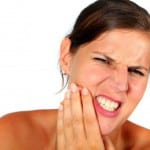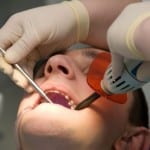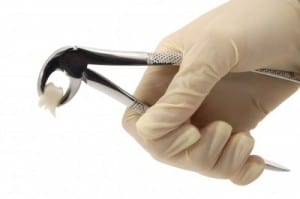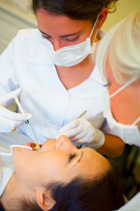 If you have to have a tooth extracted for whatever reason, there can be unfortunate side effects. A condition called dry socket develops in about five percent of cases of tooth extraction where the bone is exposed and leads to substantial pain. Being in regular contact with your dentist after extraction will hopefully reduce the risk of the condition occurring and allows it to be treated if it does so.
If you have to have a tooth extracted for whatever reason, there can be unfortunate side effects. A condition called dry socket develops in about five percent of cases of tooth extraction where the bone is exposed and leads to substantial pain. Being in regular contact with your dentist after extraction will hopefully reduce the risk of the condition occurring and allows it to be treated if it does so.
When would I get dry socket?
If dry socket is to occur, it will do so within the first few days after a tooth extraction. Having a tooth removed always leads to some pain in the aftermath of the procedure but dry socket will make itself evident with particularly discomfort. Your blood ought to properly clot in the wake of an extraction but if it doesn’t, the bone left exposed can react sensitively to food, drink and even air. The clot might fail to form or become dislodged. These are the main causes of dry socket.
How can it be prevented?
You should not smoke in the wake of a tooth extraction as it might disturb the blood clot and you ought to avoid activities such as drinking through a straw. Taking birth control pills can also compromise the body’s ability to clot, as can immune-suppressive drugs. Get advice from your Leeds dentist if you are having a tooth extracted and take birth control pills or immune-suppressive drugs.
How is dry socket treated?
Thankfully, dry socket is easily dealt with by applying medication at the site and continuing with your normal routine of dental hygiene. Always follow the advice of your dentist once you have had a tooth extracted.








 When a tooth is extracted in central Leeds, or in fact anywhere throughout the country, the mouth is going to go through a certain amount of trauma before it settles down and recovers. Now with any operation to any part of the body, as with the mouth, there are a certain set of rules laid down to ensure that you give yourself the best chance to recover the best you can and with the removal of a tooth, a blood clot will form naturally. But what happens from that moment and how you look after yourself can help prevent your mouth from developing a dry socket, because if this occurs, it can compact into other complications such as gum disease and tooth decay. If you smoke, then don’t for a while until the blood clot has healed and worked its way out of the wound- smoking impairs recovery in any operation: watch what you eat and don’t apply any extra pressure on the wound by sucking on drinks or food. Should you suffer from a dry socket, there are ways to counter the problem. Herbal remedies are excellent for post extraction treatments to soothe and to calm the gums down. If you are on any high level of medication, it would be very wise to abstain until the wound has gone through its natural process and healed properly. Also, oral hygiene should be kept at a maximum to ensure that the mouth is free of any type of infection.
When a tooth is extracted in central Leeds, or in fact anywhere throughout the country, the mouth is going to go through a certain amount of trauma before it settles down and recovers. Now with any operation to any part of the body, as with the mouth, there are a certain set of rules laid down to ensure that you give yourself the best chance to recover the best you can and with the removal of a tooth, a blood clot will form naturally. But what happens from that moment and how you look after yourself can help prevent your mouth from developing a dry socket, because if this occurs, it can compact into other complications such as gum disease and tooth decay. If you smoke, then don’t for a while until the blood clot has healed and worked its way out of the wound- smoking impairs recovery in any operation: watch what you eat and don’t apply any extra pressure on the wound by sucking on drinks or food. Should you suffer from a dry socket, there are ways to counter the problem. Herbal remedies are excellent for post extraction treatments to soothe and to calm the gums down. If you are on any high level of medication, it would be very wise to abstain until the wound has gone through its natural process and healed properly. Also, oral hygiene should be kept at a maximum to ensure that the mouth is free of any type of infection. Under normal conditions, when a tooth is extracted, a blot clot forms- this is nature’s way of healing the gums and the bone after the trauma. But on many occasions, if the blood clot is prevented, a dry socket forms, exposing the nerves and the wound to the air. People in central Leeds most likely to suffer from this condition are those who- do not care for and are clumsy with their eating post-extraction; those who allow ‘sucking’ in the mouth from spitting, coughing, or smoking within a day after the extraction; those who smoke- the toxins from smoking can block the blood flow to the clot. So if you are prone to doing this, stop it and allow the blood clot to heal naturally. But if the condition does flare-up, there are ways of treating it. Applying medications such as anesthetics and clove oil onto the area, through gauze, will help keep the socket free from dryness, and keep the blot clot in a state of flux. Like any wound in the body, a tooth extraction needs to heal the way the body knows best. Interfere, and you are stopping the chances of a full recovery and putting your health at further risk.
Under normal conditions, when a tooth is extracted, a blot clot forms- this is nature’s way of healing the gums and the bone after the trauma. But on many occasions, if the blood clot is prevented, a dry socket forms, exposing the nerves and the wound to the air. People in central Leeds most likely to suffer from this condition are those who- do not care for and are clumsy with their eating post-extraction; those who allow ‘sucking’ in the mouth from spitting, coughing, or smoking within a day after the extraction; those who smoke- the toxins from smoking can block the blood flow to the clot. So if you are prone to doing this, stop it and allow the blood clot to heal naturally. But if the condition does flare-up, there are ways of treating it. Applying medications such as anesthetics and clove oil onto the area, through gauze, will help keep the socket free from dryness, and keep the blot clot in a state of flux. Like any wound in the body, a tooth extraction needs to heal the way the body knows best. Interfere, and you are stopping the chances of a full recovery and putting your health at further risk. If you’ve just had an extraction in central Leeds of late, it’s very important that you take care of the wound afterwards, for many reasons, one of them being the development of a dry socket that can lead to further complications. Once a tooth is removed, a blood clot would normally form to aid the healing process, but if this does not happen, the surrounding bone and wound are vulnerable to infection and bacteria that can lead to the socket becoming dry. A normal extraction can take around 5 days to heal, longer in the case of teeth at the back of the mouth, but if dryness sets in, the pain can intensify around the removal site and expose the rest of the mouth to infection and gum disease, and also lead to problems in the ears and eyes. Hygiene is important in combating this problem. If the problem starts, it’s important to revisit the dentist for medication, and this may also require subsequent visits to combat the problem. Essentially, the wound should be kept clear- certain stodgy foods such as potatoes and nuts should be avoided during healing as they can lead to a build up of bacterial particles in the mouth. The use of a good mouthwash should be used after eating to remove any food left in the mouth and if the problem prevails, a dentist can prescribe drugs and recommend the use of herbal remedies such as clove and Echinacea oil.
If you’ve just had an extraction in central Leeds of late, it’s very important that you take care of the wound afterwards, for many reasons, one of them being the development of a dry socket that can lead to further complications. Once a tooth is removed, a blood clot would normally form to aid the healing process, but if this does not happen, the surrounding bone and wound are vulnerable to infection and bacteria that can lead to the socket becoming dry. A normal extraction can take around 5 days to heal, longer in the case of teeth at the back of the mouth, but if dryness sets in, the pain can intensify around the removal site and expose the rest of the mouth to infection and gum disease, and also lead to problems in the ears and eyes. Hygiene is important in combating this problem. If the problem starts, it’s important to revisit the dentist for medication, and this may also require subsequent visits to combat the problem. Essentially, the wound should be kept clear- certain stodgy foods such as potatoes and nuts should be avoided during healing as they can lead to a build up of bacterial particles in the mouth. The use of a good mouthwash should be used after eating to remove any food left in the mouth and if the problem prevails, a dentist can prescribe drugs and recommend the use of herbal remedies such as clove and Echinacea oil. Having a tooth extracted is, unfortunately, not always without side effects. In about one in every twenty extractions, a condition called dry socket can occur. This is a rather painful condition and ought to be an incentive to stay in touch with your dentist after you have had a tooth removed.
Having a tooth extracted is, unfortunately, not always without side effects. In about one in every twenty extractions, a condition called dry socket can occur. This is a rather painful condition and ought to be an incentive to stay in touch with your dentist after you have had a tooth removed. Once a tooth has been extracted there is a risk of developing the painful condition known as dry socket. In about one in twenty cases of extraction dry socket occurs but it is easily treated by your Central Leeds dentist.
Once a tooth has been extracted there is a risk of developing the painful condition known as dry socket. In about one in twenty cases of extraction dry socket occurs but it is easily treated by your Central Leeds dentist. Having a tooth extraction is a pretty unpleasant experience in itself and you no doubt would expect some discomfort for a few days afterwards, but if the pain doesn’t go away, and even begins to get worse, you might be suffering from another condition called dry socket.
Having a tooth extraction is a pretty unpleasant experience in itself and you no doubt would expect some discomfort for a few days afterwards, but if the pain doesn’t go away, and even begins to get worse, you might be suffering from another condition called dry socket.

